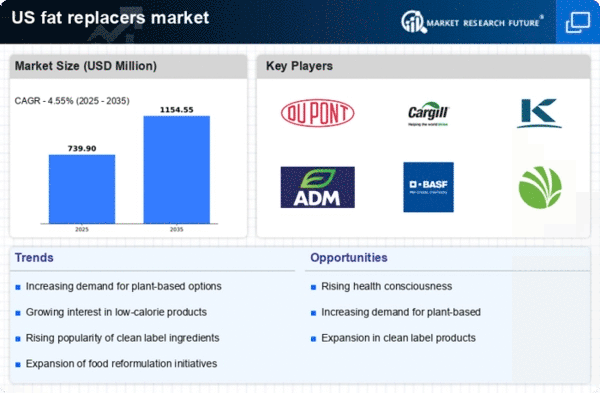Rising Demand for Low-Calorie Products
The increasing consumer inclination towards healthier eating habits is driving the fat replacers market. As individuals become more health-conscious, the demand for low-calorie food options has surged. In the US, the market for low-calorie products is projected to grow at a CAGR of approximately 5.5% over the next few years. This trend is particularly evident in the snack and dairy segments, where fat replacers are utilized to reduce caloric content while maintaining taste and texture. The fat replacers market is responding to this demand by innovating and developing new formulations that cater to the preferences of health-focused consumers. As a result, manufacturers are investing in research and development to create effective fat replacers that can meet the evolving needs of the market.
Growing Vegan and Plant-Based Diet Trends
The rise of veganism and plant-based diets is significantly impacting the fat replacers market. As more consumers adopt these dietary preferences, there is a heightened demand for plant-based fat replacers that can mimic the texture and flavor of traditional fats. The fat replacers market is adapting to this trend by developing innovative products that cater to the needs of vegan consumers. According to recent data, the plant-based food market in the US is projected to reach $74 billion by 2027, indicating a substantial opportunity for fat replacers that align with this growth. This shift not only reflects changing consumer preferences but also presents a unique opportunity for manufacturers to diversify their product lines and capture a larger share of the market.
Regulatory Support for Healthier Food Options
Regulatory support for healthier food options is influencing the fat replacers market. Government initiatives aimed at reducing fat consumption and promoting healthier eating habits are encouraging food manufacturers to reformulate their products. The fat replacers market is responding to these regulations by incorporating fat replacers into their formulations to comply with health guidelines. For instance, the FDA has implemented various policies to reduce trans fats in food products, which has led to an increased focus on alternative ingredients. This regulatory environment is likely to drive growth in the fat replacers market as companies seek to align their offerings with public health objectives and consumer expectations.
Technological Advancements in Food Processing
Technological advancements in food processing are playing a crucial role in shaping the fat replacers market. Innovations in food technology enable the development of more effective and versatile fat replacers that can enhance the sensory qualities of food products. The fat replacers market is benefiting from these advancements, as manufacturers are able to create fat replacers that not only reduce fat content but also improve texture and mouthfeel. This is particularly important in the production of baked goods and dairy alternatives, where the sensory experience is paramount. As technology continues to evolve, it is likely that the fat replacers market will see an influx of new products that leverage these advancements to meet consumer demands.
Increased Awareness of Health Risks Associated with Fats
Growing awareness of the health risks linked to excessive fat consumption is influencing the fat replacers market. Consumers are increasingly informed about the potential dangers of trans fats and saturated fats, which have been associated with various health issues, including heart disease and obesity. This awareness is prompting a shift towards products that utilize fat replacers, which can provide similar sensory attributes without the associated health risks. The fat replacers market is witnessing a rise in product offerings that highlight their health benefits, appealing to consumers who are looking to make healthier dietary choices. As a result, the market is expected to expand as more individuals seek alternatives that align with their health goals.

















